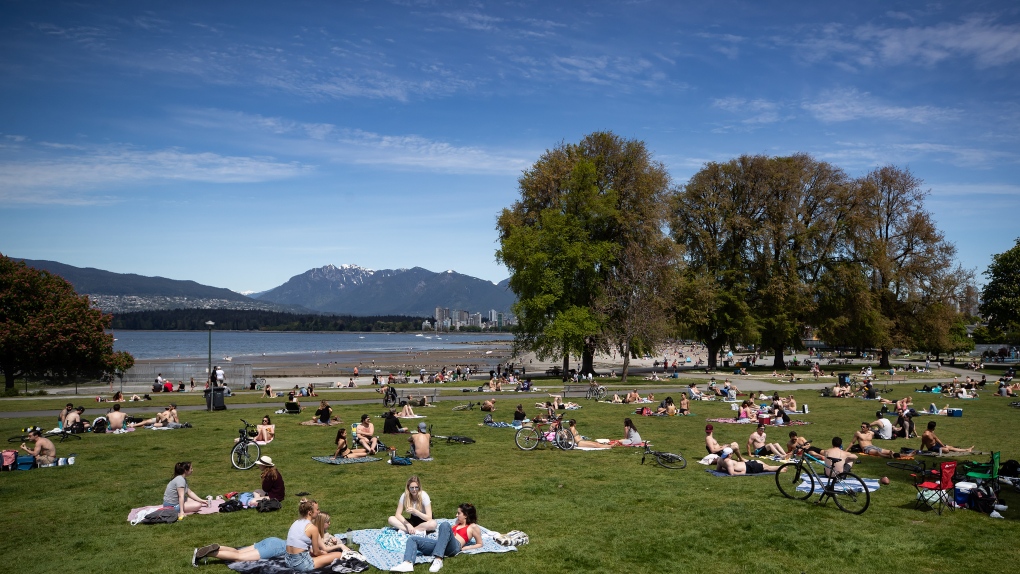Average temperatures, near-normal rainfall: What to expect this summer in Vancouver
 People sit and lie in the sun at Kitsilano Beach Park on Saturday, May 9, 2020. THE CANADIAN PRESS/Darryl Dyck
People sit and lie in the sun at Kitsilano Beach Park on Saturday, May 9, 2020. THE CANADIAN PRESS/Darryl Dyck
While it may not feel like it in Vancouver, summer will officially begin in a matter of weeks and a newly released seasonal forecast is painting a picture of what's in store.
After last year's devastating heat and wildfires, the outlook for 2022 shows a much more typical weather pattern, according to Brett Anderson, senior meteorologist with AccuWeather.
"That's probably a good thing," he says. "We always like to be near normal, really. We don't want to have those extremes and we're certainly seeing more extremes – especially with climate change."
In terms of temperatures on the Lower Mainland, that means daytime highs of around 20 or 21 C and overnight lows of between 12 and 13 C in mid-summer.
"I think we're going to be looking at temperatures probably within a half-degree of normal," Anderson says.
Rainfall also is predicted to be "near normal" for the South Coast. On average, Vancouver gets about a dozen rainy days in June, six in July and eight in August.
The reason for the relatively balmy and wet weather is two-fold, according to Anderson. First, a cooling La Niña pattern has persisted longer than it was intitially expected to.
"We thought it would start to weaken significantly through the spring into the summer. Right now it looks like it's going to maintain its strength into the summer,” he explains.
"That'll have an influence in keeping temperatures close to normal across much of B.C instead of the dry hot conditions that we saw dominate … last year."
Below-normal water temperatures in the Pacific Ocean will also, according to Anderson, have a cooling impact.
All of this gives him a reason to be relatively optimistic about the wildfire season, which he notes is a particular concern in the Interior.
"Everything tells me that this year should be better, certainly, in terms of the fire situation," Anderson continues.
"The fire risk across the Interior is still going to be higher than normal. But I don't see it as extreme as last year."
Air quality is also expected to be better overall due to more breezes blowing off of the ocean, he says.
Still, he says investing in an air conditioner will probably pay off, even if it doesn’t get much use this season.
"With climate change, in general, we are warming."
CTVNews.ca Top Stories

Ministers Joly, LeBlanc travel to Florida to meet with Trump's team
Two members of Prime Minister Justin Trudeau's cabinet will be in Palm Beach, Fla., Friday to meet with members of Donald Trump's team.
India alleges widespread trafficking of international students through Canada to U.S.
Indian law enforcement agencies say they are investigating alleged links between dozens of colleges in Canada and two 'entities' in Mumbai accused of illegally ferrying students across the Canada-United States border.
Teen actor Hudson Meek, who appeared in 'Baby Driver,' dies after falling from moving vehicle
Hudson Meek, the 16-year-old actor who appeared in 'Baby Driver,' died last week after falling from a moving vehicle in Vestavia Hills, Alabama, according to CNN affiliate WVTM.
Aviation experts say Russia's air defence fire likely caused Azerbaijan plane crash as nation mourns
Aviation experts said Thursday that Russian air defence fire was likely responsible for the Azerbaijani plane crash the day before that killed 38 people and left all 29 survivors injured.
Police identify victim of Christmas Day homicide in Hintonburg, charge suspect
The Ottawa Police Service says the victim who had been killed on Christmas Day in Hintonburg has been identified.
Pizza deliverer in Florida charged with stabbing pregnant woman at motel after tip dispute
A pizza deliverer in central Florida has been charged with pushing her way into a motel room with an accomplice and stabbing a pregnant woman after a dispute over a tip, authorities said.
Unwanted gift card in your stocking? Don't let it go to waste
Gift cards can be a quick and easy present for those who don't know what to buy and offer the recipient a chance to pick out something nice for themselves, but sometimes they can still miss the mark.
Cat food that caused bird-flu death of Oregon pet was distributed in B.C.: officials
Pet food contaminated with bird flu – which killed a house cat in Oregon – was distributed and sold in British Columbia, according to officials south of the border.
Raised in Sask. after his family fled Hungary, this man spent decades spying on communists for the RCMP
As a Communist Party member in Calgary in the early 1940s, Frank Hadesbeck performed clerical work at the party office, printed leaflets and sold books.
































